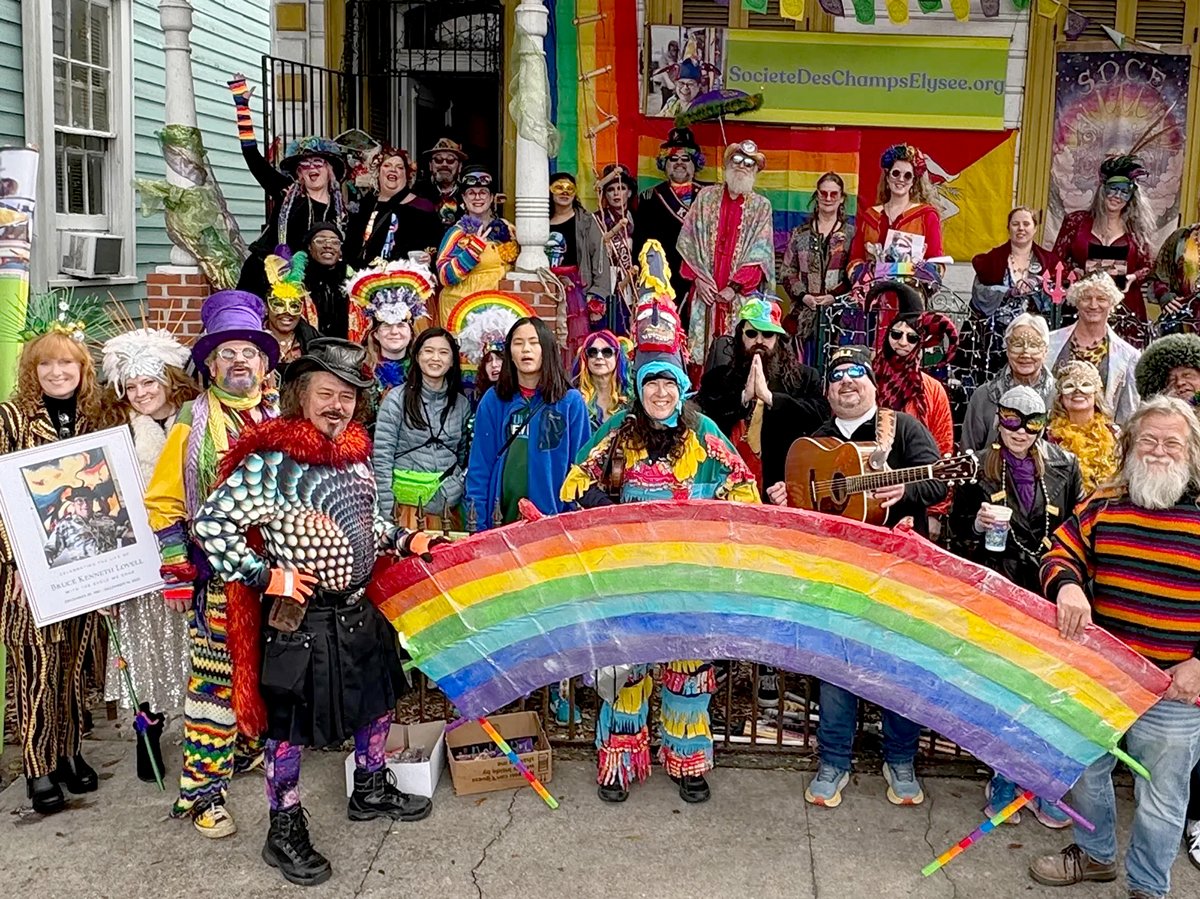The Société Des Champs Elysée: At the Crossroads
The krewe on Mardi Gras morning, 2024, photo by Ryan Hodgsdon Rigsbee, courtesy Société Des Champs Elysée website.
February 2024This Social Aid and Pleasure club focuses on the “social aid” part of their name, working year-round to feed the homeless and hungry.
– by Kim Ranjbar and Ellis Anderson
The Krewe
In the fall of 2016, the city was all a-buzz about a new streetcar line running from the New Orleans Union Passenger Terminal on Loyola Avenue to the corner of St. Claude and Elysian Fields. The $41.5 million line held the promise of greater accessibility and prospects for everyone in the community.
On the eve of his neighborhood's fortuitousness, longtime resident David Roe was excited by his community's burgeoning renaissance, and saw the perfect opportunity to form a krewe.
On January 6, 2017 - or Twelfth Night, the official beginning of the Carnival season – the Société Des Champs Elysée (or The Not-So-Secret Society of the Elysian Fields) launched their new krewe with an inaugural ride on the Rampart-St. Claude Streetcar line.
Roe and a large group of his masked friends, including The Elysian Brass band, rollicked their way down Rampart with cocktails and king cakes in hand. The “Elyseé-ans” were beginning a tradition, one they could only hope would last as long as the Phunny Phorty Phellows, a 42-year-old krewe of merrymakers who ride the St. Charles Avenue streetcar each year on Twelfth Night.
The inaugural ride, 2017, by Cheryl Gerber, courtesy SDCE website
Photo by Ryan Hodgsdon Rigsbee, courtesy SDCE website
Like many other Mardi Gras krewes, Société Des Champs Elysée members also come together with altruistic intent. All year long, Roe's eclectic krewe is on a mission to feed the hungry and unhoused of New Orleans. In fact, it's a promise required for membership, along with the modest $200 annual fee.
“Our motto is we care for everyone in the crossroads of Henriette DeLille and Elysian Fields,” said Roe. “That includes folks east, west, north and south of the intersection. If you really extend it out, it’s the whole world, of course.”
“The problem of hunger is so enormous, most people feel overwhelmed, think they can’t do anything,” Roe said. “But every little thing helps.
“For instance, one of our members, Miz Marrus, came up with the Costco Challenge. When you’re shopping there, you buy an extra rotisserie chicken - what is that, six bucks? Then you see how far you get before you give it away. No one ever makes it home with the extra chicken.”
The krewe's members do their utmost to keep their 7th and 9th Ward community fridges filled.. Over the years, the “tiny krewe with a big heart” collaborates with other organizations such as Second Harvest, Culture Aid NOLA, and World Central Kitchen to get their goods distributed to those in need.
“We’re a 501 C7 - a Social Aid and Pleasure club and the first two words are ‘social aid.’ We have not kept track of how many pounds, how many meals, how many tears or smiles have been involved since we started,” says Roe. “We just do what we can do.”
There are around 80 krewe members, including musician Gina Forsythe, photographers Cheryl Gerber and Pat Jolly, Joann and Lisa Guidos, Laura Paul of LowerNine.org, Jennifer and Matt Johnson and Margie Perez, to name a few.
Forty associate members – some of whom don’t even live in New Orleans – “throw down” money regularly for the food pantry. For the past four years, a woman in New Jersey whom Roe has never met sends 100 - 120 backpacks stuffed with homeless gear. The krewe tops them up with useful goods and food then distributes them to the homeless.
Another member, who lives in a prosperous Connecticut area, shops in thrift stores to find quality woolen goods and coats. She writes notes of encouragement, tucks them into the coat pockets and ships them south to the krewe, who make sure they keep those without walls warm in the winter.
Several members regularly carry what’s known as “blessing bags” in their cars to hand out when they come across someone in need. The bags are stuffed with snacks, a toothbrush, a razor, feminine hygiene products, sanitary wipes and more.
Three years ago when Hurricane Ida ravaged the state, Roe evacuated to Mississippi, staying with friends for weeks because of damage to his home. Though the area was tempest-swept and shipments couldn’t be made to New Orleans, donations from krewe members around the country poured into Roe’s temporary Bay St. Louis address. He and other willing hands ferried the tents, water, clothes, food and other necessities into the city for distribution at the devastated homeless camps.
The Captain
Krewe captain David Roe on the streetcar bus during the Twelfth Night festivities earlier this year. Photo by Melanie Cole for French Quarter Journal.
Roe knows first-hand how rough it can be for those without ready resources or safety nets. A seasoned musician and renaissance performer, he first came to New Orleans in the winter of 1977/78 to play music on the streets. But that winter was particularly cold and rainy, so few pedestrians in the French Quarter stopped to listen, much less leave donations in the case. Roe spent a few weeks in a Decatur Street flop house called the Rebel Arms and when he ran out of money, he “moved” to City Park for a short time.
David Roe on Royal Street with his rolling piano. Courtesy David Roe
“Then the sun came out and it was Mardi Gras and we made money and were fine,” said Roe. “I never considered myself homeless. I was an itinerant musician. Sometimes I had a roof and sometimes I did not.”
Roe still traveled after that first Mardi Gras, but New Orleans became his home base and later his permanent home. In the 80s, 90s, and into the 2000s, Roe performed at local clubs and became a favorite on the street performer scene, playing a full-sized upright piano he rolled to and from a parking garage onto Royal Street. Those experiences built his awareness of the hungry and homeless.
“When you play on the streets, that makes you homeless adjacent,” he said. “You’re sharing the street with those who don’t have a roof over their heads at night. There’s a lot of interaction.”
That interaction led to what later became a life mission, driven in large part by the examples of his late grandmother and mother. Both were Sicilian and taught David that food “is love, is love, is love.”
“That’s what I’m doing with the last part of my life, I want to help feed people.”
Roe started slowly, first creating a “magic porch” at his Elysian Fields home, leaving cans of food and clothes for any who needed them. Now, he’s stocking pantries elsewhere but keeps extra goods on hand for when someone in need who remembers the magic porch knocks on his door.
Société Des Champs Elysée Carnival Season 2024
As part of the krewe’s annual Twelfth Night tradition, they imitate the original Three Kings, bearing gifts to those who have no room at the inn.
The krewe forgoes the frankincense and myrrh, substituting backpacks, bags and boxes stuffed with easy-to-open, shelf-stable foodstuffs, clothing, blankets, water, hygiene kits and what they call “whimsy” – board games, playing cards, coloring books, and marbles. Then the krewe visits their “Calliope friends” living in tent camps under the Business 90 overpass.
One of the established camps where the krewe makes deliveries of food and supplies, photo courtesy David Roe
Afterward, the krewe rolls again, usually partying on a streetcar, but this year on bus masking as a streetcar (the Rampart line is still out of commission from the 2019 Hard Rock Hotel collapse). Captain Roe led in a dark blue “train conductor” uniform, replete with gold astrological symbols intertwined by glowing seams.
On the “streetcar” bus during Twelfth Night festivities, 2024. Photo by Melanie Cole for French Quarter Journal
For Mardi Gras day 2024, costumed krewe members from as far away as Hawaii frolicked through the French Quarter and to the river. There, they said farewell to members and loved ones who had passed on, an established New Orleans tradition for French Quarter walking krewes: mementos or ashes of loved ones are consigned to the Mississippi. This year, the ashes of Roe’s mother were released along with those of other krewe members, including board member Cindy Wexler.
The krewe down by the river on Mardi Gras day 2024, photo by Gregg Martel
Wexler will be especially missed by Roe. A Texas artist who worked in renaissance fairs since the late 70s, Wexler was a regular at the annual Mask Market in the French Market District, where she sold handmade, wearable “horns.”
“She knitted and crocheted things for every child she ever met,” Roe said. “She was one of those people who gave away everything. And she convinced others to give too.”
While Mardi Gras day is the apex event of the season, the krewe’s work continues throughout the year. Every Wednesday, krewe members make sandwiches and deliver them and other supplies to overpass camps.
At the krewe’s pantry on Wednesday, Feb 21, “Sandwich Day,” loading up to deliver food, supplies and clothing to the tent camps.
Members continue with the Costco Challenge, the gifting of bags and backpacks, and making sure pantries and community fridges are filled. And if a hurricane strikes anywhere nearby, the group works to help member Laura Paul of LowerNine.org, because of that organization’s experience in disaster relief.
But Roe harbors hope that at some point in the far future, the krewe’s work will become irrelevant.
“Our ultimate dream is to be put out of business,” he said.
The SDCE Pantaree, 501c3 donations are tax deductible. The address is paypal@societedeschampselysee.org
Features like this are made possible by reader support–We're grateful for every donation –Join our Readers’ Circle with gifts as small as $5









